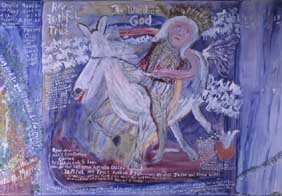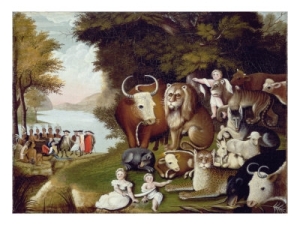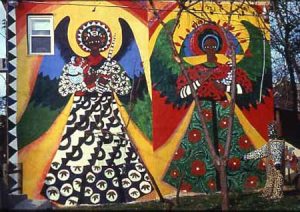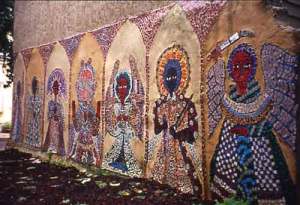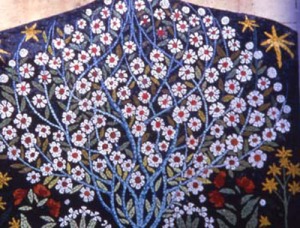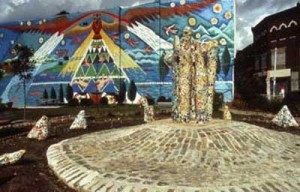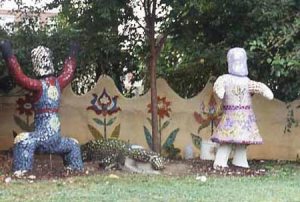It’s the End of the World as We Know It…
January 19, 2010
Humanity’s Obsession with the Apocalypse.
“It’s the end of the world as we know it …and I feel fine.” -R.E.M.
Why are we so obsessed with the end of the world? Every year a new string of threats from leading scientists, well know evangelists, and even secular politicians predict that we are heading for destruction sooner rather than later. When computers didn’t take over the world or self-destruct to bring us back to the dark ages during Y2K, we became alarmed by the inconvenient truth about global warming, which turned out to conveniently have the true facts all exaggerated (I’m not saying we shouldn’t take care of the earth, but we should be sensible in our responses to do so, and we should base our policies on solid science). Now we rub our hands and wring our fingers together fretting about the Mayan prediction of the year 2012. Popular movies and art have always capitalized on these prophetic threats of doom, and so the artists have in turn become the prophets that we blindly follow with our wallets and our fears. Even before the dawn of Christianity, Jews and Gentiles alike had already began writing “divinely inspired” apocalypses. With the American Culture being shaped in part by a Judeo-Christian value system, it is no surprise that right up until the present day even secular artists use religious symbolism when dealing with the apocalypse. Unfortunately, their own misunderstanding of the symbolism leads these artists to often become false prophets.
I have always been intrigued by the apocalypse; I love cult movies like Mad Max, The Road Warrior, and Stephen King’s The Stand remains one of my all time favorite novels. Even before I became a Christian, I had already read The Book of Revelation a few times. The Bible states that “The creation waits in eager expectation for the Sons of God to be revealed” Romans 8:19. Since we are all created beings we also, whether headed for destruction or salvation, long for revelation. I believe there is a divine blueprint of the history of the universe, with each of our personal parts in it, deep within each human being. God’s challenge in managing his will on the earth is working around our appointed free-will, yet I think that whether they are obedient to the call of God or not, artists do have the unique ability to reach deep within themselves and draw off that blueprint of eternity, and sometimes while they may get their facts wrong, they touch on a needed truth God wants to communicate to mankind.
Popular culture generally thinks of the apocalypse as the annihilation of the human race; however, a more accurate definition is more like history moving forward to God’s perfect end. When we look at early art in American culture, we can see this hope and faith in religion in paintings such as Edward Hicks, The Peaceable Kingdom, which he painted over 60 versions of. There is an obvious peace on earth after the destruction of evil. But as America has become increasingly secularized, the view of the apocalypse has changed a great deal. Secular artists usually depict the destruction of the world caused by human cruelty, immorality, and arrogance. Hope, if there is any hope offered to us at all, depends only on humanity making a drastic change to live in peace and harmony to make the world a better place. Christ is not the answer; we can only be saved through the collective moral consensus of all human beings. You would think that by now we would have proven to ourselves that we cannot do it. Neither through religion (look at the man-led Catholic and Islamic Empires of the Middle Ages), nor through humanism (look at the failure of Communism in more recent times). We need help. Strikingly different, the uncorrupted Christian worldview offers that help in the grace of Jesus Christ. Humanity as a whole will never achieve world peace, but we can each gain personal peace and eventually be rid of our selfish nature in the next age. The sacrifice of Jesus for the forgiveness of sins will lead to the coming day when Jesus will return, and all sin will be judged and cast into hell, leaving a new earth free of evil and in a state of peace. Some artists, like Reverend McKendree Robins Long, respond to the secularism of this age by painting God’s coming judgment. In his Apocalyptic Scene with Philosophers and Historical Figures, Long paints himself with Dante overlooking hell observing those he believed to be against the Christian faith.
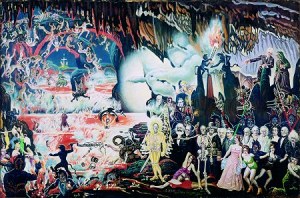
Apocalyptic Scene with Philosophers and Historical Figures, Reverend McKendree Robbins Long, late 1960s
It is interesting that many artists such as Thomas Cole and Frederick Church saw the American landscape as a New Eden, while others of their time portrayed that the idea Jesus brought of “peace on earth, good will to men” would come gradually as eventually everyone in the world would be converted to Christianity. Looking at America today, it is hard to follow such a theory. With blatant immorality on the rise, as well as the growing popularity of other religions, Christians are forced to accept a truth in the hope of Christ’s literal second coming. Yet just as the concerns of every generation’s time becomes the subject of what they think is “the signs of the times” in their apocalyptic works, it is the Christians responsibility to use whatever means exist in our world to warn those who are still lost to God of the judgment ahead; whether it is only a few months away, as some proclaim, or even if we have to wait another two thousand years.
So, how are we to know the truth? How should we respond to the many theories that have been put out there? We simply cannot know. Jesus stated that while he was on earth, he didn’t even know the day or the hour he would return (Matthew 24:36). Our response is to simply live life to the best of our ability. Carpe Diem. We take every moment we can and we live it in a spirit of joy and thanksgiving, no matter what our circumstances, thus giving our lives meaning. We take every opportunity we can to serve God, and to serve others, thus giving the broken lives we live purpose. I know many Christians who fear the end times because of the warnings of persecution and chaos the Bible gives us. I think of the images of the apocalypse in The Book of Revelation; war, pestilence, famine, death, etc. In that sense, the apocalypse is already here. Think of all the chaos millions of human beings face on a daily basis in third world countries. Think of all the religious persecution and torture millions still face in Islamic and Communist nations today. Many Christians live in the apocalypse everyday of their lives, yet they keep the faith. I don’t think the appropriate Christian response is to fear the apocalypse, but to embrace it. Though the end times are said to surely be difficult, they will only bring us closer to what is on the other side; eternity in peace and joy with our God and with those who chose to serve him alongside of us. What of those who are not yet saved? That is why the Great Commission of Jesus is so great.
Don Henly, of the Eagles, penned the lyric, “For there is no more new frontier, and we have got to make it here.” The apocalyptic artist prophesy’s this warning while simultaneously asking the question, “How can we make it?” I’m with the artists who have placed their hopes in Jesus Christ:
“’Behold, I am coming soon! My reward is with me, and I will give to everyone according to what he has done. I am the Alpha and the Omega, the First and the Last, the Beginning and the End’” Revelation 22:12-13.
“The Spirit and the bride say, ‘Come!’ and let him who hears say, ‘Come!’ Whoever is thirsty, let him come; and whoever wishes, let him take the free gift of the water of life” Revelation 22:17.
“He who testifies to these things says, ‘Yes, I am coming soon.’
“Amen. Come, Lord Jesus” Revelation 22:20.
Peter L Richardson
4/6/1999, revised 1/18/2010
Lessons from Job: Friend of God
January 12, 2010
Job’s redemption and restoration
“I knew of you then only by report, but now I see you with my own eyes. Therefore I yield, repenting in dust and ashes.” The Book of Job 42:5-6
Is it possible to love someone you don’t know? When I was in high school, I tried to play the tough guy, but the truth is I was extremely shy when it came to the opposite sex. I remember being switched into a new study hall, and there was this girl I had not seen before. She was amazing. Soft skin with a deep natural tan, long black wavy hair, she was stylish and sexy; she seemed very sophisticated. I was in love. This was in the days when a study hall was expected to actually be a study hall, and the teacher was very strict, so I had no way of casually getting to know her. If I wanted a chance with this beauty, I would have to actually approach her before or after class in the hallway. It took me months to finally step up and make my move. When I did, I was in for a quite a shock. In my first conversation with her, out of her mouth came the most foul, ignorant and rude words I had ever heard come from a woman. She was petty; she was racist; she was crude, and she did nothing but complain. I wasted months of my life pining after a girl who turned out to be someone who turned my stomach. I thought I was in love, but I only loved the idea I had created in my mind. True love requires intimacy, and true intimacy requires genuine communication. Both parties in the relationship need to be open and vulnerable, and both need to be willing to share and to listen. Too many people live life among those they call family and friends, but they don’t really know each other. They never allow themselves to know and to be known; therefore, there really isn’t any relationship. I believe this was the situation between Job and the Lord. The text makes it clear that Job really was the most righteous person on earth. He did everything he was supposed to do in the eyes of God, but he didn’t really know God. He lacked a strong relationship with the God that he served so faithfully, so at the end of the day, he was just God’s best servant. God wants more from us; he does not want peons constantly bowed down before him saying, “Yes, Master. Coming, Master! What is thy bidding, my Master?” He created us to have relationship with us, and he did not want Job’s dedication to go to waste. When Satan bet the Lord that Job would curse him if he lost everything, I think it was a legitimate gamble for both of them. At stake was whether or not God was worthy to be worshiped for who he is and not for just handing out rewards and punishment. Satan was aware that Job was God’s best servant, and God was well aware of Job’s pride and trust issues and his lack of relationship. Job really could have gone either way, but God saw his opportunity to make his best servant one of his best friends. After God’s long barrage of questions putting Job in his place, Job responds with genuine humility and repentance, and we can see by the way the Lord treats him in the epilogue that Job has received a greater reward than the riches everyone celebrates. In fact, I believe that Job had to pass one more test of friendship before he was able to get those riches restored back to him.
The first thing Job does in his reply to the Lord is acknowledge his lack of understanding. He states, “I know that you can do all things and that no purpose is beyond you. You ask: Who is this obscuring counsel yet lacking knowledge? But I have spoken of things which I have not understood, things too wonderful for me to know” The Book of Job 42:2-3. Job’s reply shows he understood God’s point loud and clear, he is saying to the Lord, “Yep. I’ve got nothing on you. You are the creator, you are my sustainer, my protector, and you have never let me down before. Even though I did not understand what was going on, I should have trusted you had a purpose for it all.” The second part of Job’s reply reveals that Job learns what his biggest problem was, “Listen, and let me speak. You said: I shall put questions to you, and you must answer. I knew of you then only by report, but now I see you with my own eyes. Therefore I yield, repenting in dust and ashes” The Book of Job 42:4-6. Job acknowledges that he lacked a relationship with the Lord. He is saying, “Before, I could only speak about what I heard about you, but now that I know you, I understand who you are and what you are about, and I’m so sorry for every foolish boast that came out of my mouth!” Job learned first hand the reason we are to be obedient to God; it is not for receiving blessing or fearing punishment, it is about serving him out of our love for him. Job did everything right, but he did not really have the right motives. Therefore, in his love for Job, God allowed him to suffer so Job could realize the need he had for a relationship with God. When you think about it, this lack of relationship is the root of Job’s other issues. Had Job had a strong relationship with God, he would have trusted in God’s motives from the beginning. Had Job trusted God more, he would not have begun to rely on his own good works and wisdom more than God’s grace and mercy, which led to his pride. What God does next shows that he now views Job as a friend, and he honors Job by giving him the responsibility of someone who has a maturity and wisdom that can be trusted.
Job’s reply to the Lord is the last of the poetry written in The Book of Job; however, the action is far from over in the Epilogue written in prose. The Lord now turns to Job’s friends, Eliphaz, Bildad, and Zophar. He states: “My anger is aroused against you…unlike my servant Job, you have not spoken as you aught about me. Now…go to my servant Job and offer a whole-offering [sacrifice] for yourselves and he will intercede for you. I shall surely show him favour by not being harsh with you because you have not spoken as you aught about me, as he has done” The Book of Job 42:7-8. Can you imagine being in their shoes at this point? God himself manifests before them, and after dealing with Job, he turns to them and essentially says, “And you! I’m really pissed at you! You think I’m only about judgment and punishment? You think Job deserved all the pain and suffering he’s been through? Instead of helping and encouraging him through these trials, you only made it worse! Do you really want to see my punishment? You better make your sacrifices and go get your buddy Job to pray for you, because the only way I’m going spare you is if he intercedes and prays on your behalf!” This is the evidence that Job has moved from only being a servant to being a friend of God. All through the text, Job longed for someone who could speak to God on his behalf, he wanted a mediator between him and the Lord. God honors Job by giving him that position with his friends. He becomes the very defender he longed to have: Someone who could talk to God freely without fear of death. God is about to come down hard on Job’s friends for slandering his character and he simply puts the matter in Job’s hands, “Job, I know these guys are your boys, and since you and I are buds now, if you want me to spare them just say the word; otherwise, get out of the way…” Do you see the trust God has for Job? How he puts his end of the relationship into practice right away? Job has a choice to make. He could pray for his friends or step aside and let them get a taste of what he’s experienced. In order for Job to genuinely stand before God and intercede on their behalf, he needs to forgive them. Could you forgive them if you were in Job‘s place? After the harsh treatment they gave Job, do they deserve his forgiveness? But that is the beauty of forgiveness, we never deserve it.
This is Job’s final test. I think it is amazing that God says that Job spoke rightly about him. This shows us the amount of freedom he gives us to express our thoughts and emotions to him. If you are angry at God, go ahead and let it out. If you are doubting anything, even his very existence, go ahead and question him. He is man enough for the challenge, and just like Job, he will lovingly put you in your place if you humbly submit to the truth. The difference between Job and his friends was that they thought they could speak for God; they judged Job, and they considered that judgment to be God’s. How many of us do this very same thing today? We see others in trouble and we write them off and assume they must of have deserved it. Praise God we rarely get what we really deserve. Where Job got it right was that he acknowledged his lack of knowledge and understanding. He didn’t always express himself with the respect and honor that the Lord of the Universe deserves, and God dealt with that, but when Job became distressed, he sought out God and asked for his help. He didn’t get the answer he expected from God, but through God’s answer he discovered greater revelation about himself and about God, revelation which resulted in a new and deeper relationship with God. This could be the end of the story. God could punish Eliphaz, Bildad and Zophar for their slander of Job and of God himself. Then we could all feel a sense of superiority over them, as they get what they deserve, and smugly think we would never treat a friend of ours in need like that, and we could close the book and move on with life. But God is not finished teaching Job and, therefore, teaching us. This paragraph ends with, “and the Lord showed favour to Job when he had interceded for his friends.” Look at the wording of the sentence; “when” is past tense. God did not show Job favor until after he prayed for his friends. The very next paragraph begins with “The Lord restored Job’s fortunes, and gave him twice the possessions he had before” The Book of Job 42:9-10. I am confident that Job has at this point found relief from his physical sufferings, but I believe that Job had to pass this final test to receive a full restoration from the Lord. Job and his friends got pretty nasty with each other, and it turns out that Job was right. Before he could genuinely intercede for them, he needed to forgive them. In other words, Job needed to forgive his friends to get his restoration. I don’t think God really had a strong desire to smack down Eliphaz, Bildad and Zophar. God is proving that he is all about relationship. Job could have held a quiet grudge against them for the rest of his life, but when God puts him on the spot like that, he forces Job to deal with his emotions and find the forgiveness in his heart that God generously hands out to us. God was teaching Job and his friends that while doing good does lead to blessing (of course there are many forms of blessing besides monetary gain), sin does not always bring judgment. Often an act of mercy and forgiveness will bring more positive change than punishment. That does not mean there won’t be consequences, but God wants to show Job, his friends, and us that just as he forgives us, he expects us to do the same for others. Job’s forgiveness of Eliphaz, Bildad and Zophar is the first step needed for their friendship to be restored.
The Lord brings the lesson of relationship home for us in this ancient book in the way he restores Job’s fortunes. He just finished declaring how powerful he is and how nothing is beyond his means; God could have just said the word and dropped riches into Job’s lap, but he chose to restore Job a different way, and it is the same way he has continued to prefer to use throughout the ages up until today. After the author states that the Lord gave twice as much as Job had before, he continues with “All Job’s brothers and sisters and his acquaintance of former days came and feasted with him in his home. They consoled and comforted him for all the misfortune which the Lord had inflicted on him, and each of them gave him a sheep and a gold ring” The Book of Job 42:11. God used people to restore Job’s fortunes. This teaches us a few lessons. First of all, God is not only concerned with us having a good relationship with him, but he wants us to have a good relationship with our fellow man. Many people will pray to God for miracles, but they end up rejecting his help, because it comes in the form of other human beings. God often does answer prayer through miraculous means, but more often he chooses to work through other people. He wants us to be willing to deal with the messiness of learning to trust and depend on each other in addition to trusting him. Secondly, if God uses people to bestow his blessings, the question must be raised, “How does he want to use me?” How many people have gone without because God called you to bless them, but you were too busy to hear, or too selfish to respond? We often question God’s existence, or at least his righteousness when evil seems to prevail on the earth, but before we question God, maybe we should look at what we should be doing. Are we doing anything to stand against evil? Are we contributing to the evil in some small selfish way? God wants to use you to bring his good purpose to the world. Are you listening for his call? Lastly, look at what Job’s friends and family gave him. They each gave him one sheep and one gold ring. Before this experience, Job was considered to be “the greatest man in all the east,” and the text states that the Lord “gave him twice the possessions he had before.” Think about that. My guess is that the majority of the sheep and rings came from his acquaintances. Who were his acquaintances? They were all the people that Job had helped earlier in his life. In his effort to serve God righteously, Job was generous with his wealth; now that Job’s time of trial had ended and he was in need, these people stepped up and gave back, and Job ended up with twice the fortune he had before. The Bible states elsewhere that “everyone reaps what he sows” Galatians 6:7. Job sowed a lot seed into his fellow man, and he was able to reap the harvest of return. He must have helped a lot of people! This again supports God’s principle of relationship. When we are generous with others, whether it be money or time, they will be generous with us. Maybe not everybody, but the majority of humankind will come through for those who have shown them kindness in their time of need. So we see that God does not only want us to have a strong relationship with him, but he also teaches us to take care of each other and learn to get along.
This getting along does not mean that we should incorporate a truth-is-relative-philosophy and we should just live and let live. On the contrary, God calls us to be righteous and to follow his example out of love for him. We know his standards through the Word of God, and we must seek to live up to them and encourage and even admonish our fellow man to do the same. However, when we fail to live up to the standards, we go to our merciful God through the path Jesus has created for us, and we seek forgiveness in true humility, and he will not fail to give it out. Likewise, when our brothers and sisters sin against God or against us, we need to be willing to confront them in love and then we continue to love them and forgive them despite their response. Forgiveness does not always require that we must continue to spend time those who hurt us, but it does mean that we need to let go of the desire for revenge and the desire to be paid back in some form. That is why getting along is so difficult for us. We are all selfish. Since Adam and Eve chose their way instead of God’s, the desire to be “god” has carried through all our genes and we just want to do what’s best for “me” despite the consequences. We hurt each other, but God wants us to forgive each other. He wants us to continually seek to live our best and to treat others the same way we want to be treated (Luke 6:31). This is the crux of all of God’s teachings in his Word: “Love God. Love others” (Matthew 22:36-40).
There are many themes and many lessons that you can take from The Book of Job, but in my opinion the fact that relationship is more important that righteousness is the strongest lesson. Job had what the church today calls a works-mentality. He depended more on his works, his own personal righteousness, than on God’s grace. However, the Bible states that “all our righteous deeds were like a filthy rag” Isaiah 46:6, and later the Apostle Paul states “for all alike have sinned, and are deprived of the divine glory; and all are justified by God’s free grace alone, through his act of liberation in the person of Christ Jesus” Romans 3:23-24. You can see this truth in the life of Abraham. If Job is a historical figure, he would have been Abraham‘s contemporary. As we read about Abraham, we find he was far from perfect, but he put his faith in God, and sought to obey and please God because of the relationship he had with his Creator. The Apostle James says of him, “Here was the fulfillment of the words of scripture: ‘Abraham put his faith in God, and that faith was counted to him as righteousness,’ and he was called ‘God’s friend’” James 2:23 (see also: 2 Chronicles 20:7, and Isaiah 41:8). Like Abraham, our righteousness can only come through faith. Before his experience, Job was not that different from the Pharisee’s of Jesus’ time. They followed God’s written law in the Torah to the letter. They were as perfect as human beings could be, and they longed for their Messiah to come and end the suffering of their people; however, when the Messiah arrived in the person of Jesus, they did not recognize him because they were more concerned about following rules than they were about having a relationship with their God. When he showed up in the person of Jesus, they couldn’t even recognize him.
In our age, Jesus is our mediator who allows us to freely speak with God. After discussing how Jesus is both our high priest and our sacrifice, the author of Hebrews states, “Let us therefore boldly approach the throne of grace, in order that we may receive mercy and find grace to give us timely help” Hebrews 4:16. Before the time of Jesus, very few humans were recorded as holding the honor of being friends with God, but Jesus came to restore God’s relationship with all of humanity. Because of Jesus, we all can be God’s friends. According to the Apostle John, during the Last Supper (before Jesus was crucified) Jesus was giving his instructions to his disciples and explaining what they were up against in the days ahead. He was instructing them to love each other and to love God despite the coming pain and confusion they were about to experience. During this speech he tells them, “There is no greater love than this, that a someone should lay down his life for his friends. You are my friends if you do what I command you. No longer do I call you servants, for a servant does not know what his master is about. I have called you friends, because I have disclosed to you everything that I heard from my father” The Gospel of John 15:13-15. This was after he told them that they were all about to deny that they even knew him, but he would be waiting for them with open arms when they were ready to come back. God desires us to live righteously; he wants us to follow the rules he’s established (which were established for our good and protection), but he is much more interested in having a relationship with us. The desire to be good should not come from a fear of punishment or from the expectation of reward; we should want to be good in a desire to please God; we should be good because it makes him happy. The ultimate reward for us is simply to know, and to be known by, our Father in heaven.
This is the final conclusion… Job was the most righteous man on all the earth, but he was only God’s best servant. God initiates the conversation with Satan, the Adversary, which led to Satan’s challenge. God must have known what the result of that conversation would be, and Job loses everything including his health. His three friends show up to comfort him, but they only provoke him into deeper despair claiming Job must have sinned horribly to get all that misfortune; however, through his speeches defending his innocence, a lack of trust and a bit of self-righteousness is revealed, or what we consider a “works” mentality. By the end Job states that before he only “heard about” God, but now he “knows” God. We learn that God wanted more for Job than just servant-hood. That teaches us that it is more important to God that we seek out a relationship with him, than just try to serve him through good works. Our righteousness comes from faith in God, our good deeds should come from a desire to please him out of love rather than from a fear of getting struck by lightning.
- All scripture references are from The Oxford Study Bible: Revised English Bible with the Apocrypha.
Peter L Richardson
2010
The Village Neighborhood:
January 5, 2010
Angelic Humanity Manifest
“Truth reaches the mind most easily by the senses.” -Father Paul Dobberstein
Years ago I found myself a newly married father at the ripe old age of 19. Scared, but determined to provide for my new family, I dropped out of college and began my journey into “the real world.” A friend of the family offered me a job through a laborers union in Philadelphia. A dead end job with what seemed like great pay at the time. I went from frolicking the tree laden campus of the University of Delaware to literally digging holes in the trash laden streets of Philly. Growing up in the shadow of Philadelphia, I had been to the city’s tourist attractions many times, but with this experience I got a first hand look at how depraved many parts of the city were. Houses crumbled around our work sites, discarded cars were strewn throughout the city, and bullet holes often decorated the buildings that managed to remain standing. The company I worked for had a contract with the city to dig up all the rotting gas and oil tanks buried in old gas stations and maintenance shops and replace them with environmentally safe tanks. I was on the crew that got to dig them out and dig up the contaminated soil. It was lovely work. In less than six months the company downsized and I welcomed the day I got laid off. I left without any desire to return to Philadelphia; it was years before I even returned as a tourist. After working construction for a few more years, I decided to try college again, so I enrolled at UD once again as a part-time student. I ended up taking a one-time-offered Art History class titled “American Art and the Religious Imagination.” It is easily one of the best classes I have ever taken. The grad student who was in complete creative control taught with passion, and he even required us to take field trips. One of the places we visited in North Philly was called “The Village Neighborhood.” It began in 1986 as a community outreach by Lily Yeh to clean up the park of a run down neighborhood and to use the materials of the city to create art that could bring a little beauty and color into an otherwise drab existence. Since then the project has grown throughout 260 blocks of the neighborhood. As I walked the streets of The Village Neighborhood, I was touched by more than the interesting urban artwork. I saw a people who were small in number developing a way that could transform a community with no hope to one that could produce a significant change in the lives of a significant amount of people.
As we drove through the poverty stricken streets, I noticed most of the empty lots still had debris from the demolished buildings and a lot of trash built up from what some members of the community left lying around. Everything was rundown, falling apart, littered and graffitied. Kids played right on the streets with the trash and decaying architecture. Some graffiti was more art rather than just tagging; I have always been intrigued by the amount of quality murals that decorate the various areas of Philadelphia. Every time we passed an interesting mural, I expected it to be the beginning of the Village; yet as we turned by Guardian Angel Park, I immediate realized why this was considered to be a sacred place. Two tall angels looming over the community painted on the side of a house send a definite message to onlookers that this place is protected. Whether the protection is from a deity or simple the strength of the community depends upon your faith, but a deeper look into these few blocks reveals more than fancy artwork and few cleaned up lots. The Guardian Angels overlook concrete children and animals playing beneath them. Each angel bears a sword and cradles a child to suggest that true safety needs more than outward strength, but also the intimacy and love that brings inward security and confidence. The abstract colors and shapes of the concrete creations are symbolic of the abstract and colorful life in the inner-city, and the concept of using tiles, bricks and concrete is brilliant for an area where vandalism and decay have been prevalent. As special and sacred as this place is, it does not feel at all out of place in the city. There is a comfortable flow from the surrounding city blocks to where the streets seem to grow into angels and children and concrete arms reaching up for joy in a dance of colored tiles with a backdrop of urban mysticism.
Angel Alley is just as intriguing as the park. With warrior angels lined up from one end to the other, one can stroll down this alley with confidence. In the middle of the angels is a figure who must represent a deity, at least a man in charge, or perhaps he represents the community being protected. Of the angels that he stands between, one holds a book which might represent scripture, or it could symbolize the freedom that gaining an education can bring. The other holds a baby, perhaps a symbol of Christ, or just the comforting thought of having security in faith. The Village Neighborhood seeks to meld differences of religion together in order to achieve a sense of common unity. The wall opposite the angels displays a pattern of tiled squares checker-boarding triangles with smiling faces. They give the pedestrian a sense of welcome.
Meditation Park has a slightly different look with its stone ground and only one large circle seating place. Its surrounding walls only bear one image of the Tree of Life. In the Christian tradition the Tree of Life represents innocence, purity and eternity. However, as one sits and meditates in this surrounding area, it is easy to get the impression that this Tree not only represents new spiritual life, but also the growing and budding life of the community from the ruins of an at-risk neighborhood. That is exactly what the combination of artists, teachers, and community members have done here. In addition to the artsy remodeling of the exterior of the buildings and empty lots, they have also repaired abandoned buildings and transformed them into art and education centers. Joseph Joubert, a 19th century French philosopher, said, “He who has imagination without learning has wings and no feet.” The Village takes kids off the streets and offers them the foundation they need to help them accomplish whatever their dreams may be.
Ile Ife Park, however, is my favorite place in the community. The first to be conceived and created by Yeh, Ile Ife Park has a path through beautiful gardens, concrete chairs and couches (which are actually comfortable to sit in), and a group of concrete arms growing up from the ground and reaching into the sky. This stage is set against a mural displaying a large bird in flight signaling to anyone in the community who gathers there that they also can fly. I have learned that a key difference in those who are poverty-minded and prosperous-minded is the later like to surround themselves with objects of beauty and art (Eberle 104). Art and nature inspire the human soul to be creative and productive. I have also read about a doctor who worked in Harlem and lamented that the poor he served just needed something to break the cycle of poverty; he observed that even if he ended up on the street with no money and no housing, he still had his positive upbringing and education to enable him to get up again. Lily Yeh not only brought a community together to create external beauty, but she has started a movement that brings education and inspiration to the impoverished and gives them the opportunity to take responsibility for their neighborhood and their own lives as they learn and grow in confidence and self-esteem. This movement has grown from The Village Neighborhood in North Philly into the organization Barefoot Artists which replicates the success of The Village to impoverished communities all over the world.
Being guarded by angels, The Village Neighbor-hood truly is a sacred place. Does sacredness rest in the traditions of objects and ancient cathedrals and temples, or is it a matter of the heart? Is sacredness religion? If so, my religion teaches that, “a pure and faultless religion in the sight of God the Father is this: to look after orphans and widows in trouble” (James 1:27, Revised English Bible). When he was criticized for hanging out with people considered profane, Jesus replied, “It is not the healthy who need a doctor, but the sick; I did not come to call the virtuous, but sinners” (Mark 2:17, Revised English Bible). Whatever your faith is, let’s break out of our traditions and start healing people. There might not be a program as interesting as The Village Neighborhood in your community, but there is always something you can do to contribute and help those who are in need. Perhaps you are called to start something on your own. My experience at The Village planted a seed in me, and eventually I got involved in my own church’s outreach to the projects of Wilmington, DE. Before our class left for the day, I was able to chat with a few kids who were finishing up pottery projects. They all said they loved their classes “except for the cleaning up.” These kids now have the experience of owning a sense of creativity and accomplishment; they have more tools to help them move past the limited expectations of poverty level children. As they grow older and move on with life, I’m sure they will each get a sense of awe and sacredness in their hearts when they think of their experience in The Village Neighborhood.
For more information check out the following websites:
http://www.villagearts.org/index.htm
http://www.barefootartists.org/index.html
- Eberle, Harold R. Developing a Prosperous Soul, v.1. Winepress Publishing. Yakima: 1997.
- All scripture references are from The Oxford Study Bible: Revised English Bible with the Apocrypha.
- All pictures are from barefootartists.org.
Peter L Richardson
Spring 1999, revised Winter 2009

